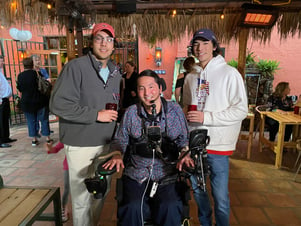Hope Happens Here: Dr. Rex Marco
Dr. Rex Marco spent decades building a life dedicated to making a difference. A nationally renowned spinal surgeon and musculoskeletal oncologist, he combined the two specialties because he wanted to save lives, tackling high-risk cases ranging from teenagers paralyzed in car accidents to cancer patients with tumors embedded in their spines.
 But this version of his world vanished on July 21, 2019, when a mountain bike ride turned tragic: Dr. Marco’s tire stalled in a dip along the trail, sending him headfirst over the handlebars. Hearing a crack but feeling no pain—feeling nothing at all– he knew what had happened.
But this version of his world vanished on July 21, 2019, when a mountain bike ride turned tragic: Dr. Marco’s tire stalled in a dip along the trail, sending him headfirst over the handlebars. Hearing a crack but feeling no pain—feeling nothing at all– he knew what had happened.
Suddenly, he was a spinal surgeon with a C4 spinal cord injury. Yet, even as he lay in the intensive care unit at Houston’s Memorial Hermann Orthopedic & Spine Hospital, Dr. Marco didn’t grieve his changed body or the life he had lost. Instead, he found himself thinking about Christopher Reeve.
“I knew that I could be angry, but I didn’t feel angry,” Dr. Marco says. “I knew I wanted to do what Christopher Reeve did. I wanted to help raise money for research and help find treatments for people with spinal cord injuries. I thought of him so much during that time. I knew that was part of the plan.”
The future Dr. Marco started building in his mind just hours after the accident began in earnest this week with the launch of The Rex Marco, M.D., Fund of the Christopher & Dana Reeve Foundation. The fund, created with a seven-figure lead gift from Dr. Marco’s Spine and Extremity Tumor Research Endowment, will help accelerate groundbreaking research toward cures for spinal cord injury (SCI) and provide advocacy support and resources to improve quality of life for those impacted by paralysis.
Reeve Foundation President and CEO Peter Wilderotter described Dr. Marco as a perfect partner for the foundation.
“With his unique perspective – that of a physician and someone living with a spinal cord injury – Dr. Marco will be at the center of an agenda that drives innovation across the care-cure continuum and brings the scientific arena, industry, and the individuals and families affected by paralysis together in bold new ways,” Wilderotter says.
Long before his injury, Dr. Marco understood the power of coming together in times of crisis. As a surgeon, he worked with teams of experts whose individual roles were collectively critical in determining a patient’s successful outcome. He traveled the world on medical relief missions, sharing his expertise with hospitals in Kenya, Haiti and Guatemala. And throughout his own rehabilitation, including three difficult months on a ventilator, Dr. Marco felt the sustaining embrace of family, friends and former patients, including many living with paralysis.
“This community has been amazing, and I’m still learning from them and being inspired by them,” he says. “To see what they could do, to see some people walking, to hear their stories, has helped me a lot.”
Equally critical to his recovery, Dr. Marco says, was practicing mindfulness, something he’d begun several years earlier with a local community group in Houston.
“We were always asking for the serenity to accept the things we cannot change and the courage to change the things we can, and the wisdom to know the difference,” he says. “I knew that even if I broke my neck that there was still a way that I could have serenity. I could just ask for it. The one thing I could change was to accept it.”
As he grew physically stronger, Dr. Marco thought more and more about his dream of raising money for spinal cord research. Last spring, a friend suggested he speak with Alan Brown, Reeve Foundation Director of Public Impact.
“I was struck by his vision and the way he spoke about helping others,” Brown says. “I knew he could help us push the needle forward. Caring and giving back is what Reeve is about, and now we’re able to do it together.”
Dr. Marco will serve as Chief Medical Ambassador for Reeve Research Collaborations and will also join the Reeve Quality of Life Grant Program Committee. He is eager to raise awareness about the foundation’s work, but also to share his profound sense of hope with other individuals living with paralysis.
Even outside of the operating room, there are still many ways to make a difference.
“I want to keep giving back,” he says. “If I didn’t, I don’t think life would feel as fulfilling.”
Join Our Movement
What started as an idea has become a national movement. With your support, we can influence policy and inspire lasting change.
Become an Advocate